
China Center of mHealth Innovation
The Chinese government’s 12th Five Year Plan prioritizes the development of affordable, accessible health care for China’s entire population. Wide-scale use of mobile technology in health care aligns with the government’s policy objectives.There is a pressing need for fresh approaches to community healthcare in China and globally, particularly in resource-poor areas.
Aims:
- The China Center for mHealth Innovation (CCmHI), was established in late 2014 by The George Institute for Global Health at Peking University Health Science Center and Qualcomm® Wireless Reach™.
- CCmHI aims to improve community health care in China through the study of affordable, sustainable mHealth interventions, which target the nation’s leading causes of premature death and disability, while supporting the central government’s deepened commitment to health care reform.
Methods:
- Build Chinese capacity in digital healthcare development and evaluation, including providing opportunities for student internships and fellowships.
- Develop and evaluate mHealth platforms designed to provide community healthcare workers with evidence-based, personalized guidance about the care of individual patients.
- Target the 10 leading causes of premature death and disability in China.
- Provide solutions that are effective in both urban and rural settings.
- Assist with the integration of mHealth strategies into national and provincial policies and guidelines.
- Support the development and expanded use of mHealth technologies globally.
Impact:
- Initially, CCmHI will conduct a landscape analysis of digital health policies, laws, standards, programs and research activities in China, all of which will inform CCmHI’s pilot and flagship research efforts.
- CCmHI aims to develop and field test at least one mHealth program for chronic disease management in its first year, which will lead to larger scale mHealth programs in future years.
- China has the potential to affordably create and link sophisticated digital health systems for healthcare workers, electronic health records, point-of-care diagnostics and systems that will enable regional health authorities to monitor and manage the quality and outcomes of community healthcare. Combined with consumer applications that provide tools for self-care use, these new digital health systems can enable solutions to healthcare delivery obstacles. CCmHI will play a lead role in China’s evolving.


